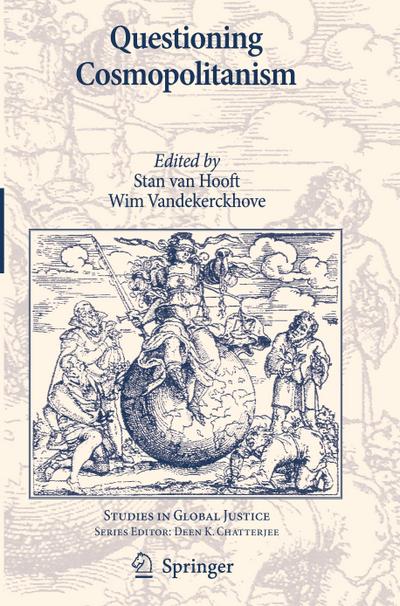
2011, ISBN: 940071565X
[EAN: 9789400715653], Neubuch, [SC: 0.0], [PU: Springer Netherlands], ETHIK; ETHOS; PHILOSOPHIE / MORALPHILOSOPHIE; GESELLSCHAFT, POLITIK, STAAT; POLITIK POLITIKWISSENSCHAFT; POLITOLOGIE;… Meer...
| ZVAB.com AHA-BUCH GmbH, Einbeck, Germany [51283250] [Rating: 5 (von 5)] NEW BOOK. Verzendingskosten:Versandkostenfrei. (EUR 0.00) Details... |

2011, ISBN: 9789400715653
Springer, Taschenbuch, Auflage: 2011, 260 Seiten, Publiziert: 2011-05-03T00:00:01Z, Produktgruppe: Buch, Hersteller-Nr.: 3 black & white tables, biography, 0.82 kg, Recht, Kategorien, Büc… Meer...
| Amazon.de (Intern... |

ISBN: 9789400715653
Paperback / softback. New. Cosmopolitanism is an emerging movement in global ethics. This book provides cutting edge essays by leading scholars on cosmopolitanism. It is written in a sty… Meer...
| Biblio.co.uk |

2011, ISBN: 940071565X
[EAN: 9789400715653], Nouveau livre, [SC: 69.56], [PU: Springer], Books
| AbeBooks.fr Lucky's Textbooks, Dallas, TX, U.S.A. [60577173] [Note: 5 (sur 5)] NEW BOOK. Verzendingskosten: EUR 69.56 Details... |

ISBN: 9789400715653
Springer , pp. 260 Index. Papeback. New., Springer, 6
| Biblio.co.uk |


2011, ISBN: 940071565X
[EAN: 9789400715653], Neubuch, [SC: 0.0], [PU: Springer Netherlands], ETHIK; ETHOS; PHILOSOPHIE / MORALPHILOSOPHIE; GESELLSCHAFT, POLITIK, STAAT; POLITIK POLITIKWISSENSCHAFT; POLITOLOGIE;… Meer...

2011, ISBN: 9789400715653
Springer, Taschenbuch, Auflage: 2011, 260 Seiten, Publiziert: 2011-05-03T00:00:01Z, Produktgruppe: Buch, Hersteller-Nr.: 3 black & white tables, biography, 0.82 kg, Recht, Kategorien, Büc… Meer...
ISBN: 9789400715653
Paperback / softback. New. Cosmopolitanism is an emerging movement in global ethics. This book provides cutting edge essays by leading scholars on cosmopolitanism. It is written in a sty… Meer...
2011, ISBN: 940071565X
[EAN: 9789400715653], Nouveau livre, [SC: 69.56], [PU: Springer], Books
ISBN: 9789400715653
Springer , pp. 260 Index. Papeback. New., Springer, 6
Bibliografische gegevens van het best passende boek
Gedetalleerde informatie over het boek. - Questioning Cosmopolitanism (Studies in Global Justice, Band 6)
EAN (ISBN-13): 9789400715653
ISBN (ISBN-10): 940071565X
Gebonden uitgave
pocket book
Verschijningsjaar: 2011
Uitgever: van Hooft, Stan, Vandekerckhove, Wim, Springer
229 Bladzijden
Gewicht: 0,390 kg
Taal: eng/Englisch
Boek bevindt zich in het datenbestand sinds 2009-05-08T12:15:18+02:00 (Amsterdam)
Detailpagina laatst gewijzigd op 2023-07-19T16:29:33+02:00 (Amsterdam)
ISBN/EAN: 9789400715653
ISBN - alternatieve schrijfwijzen:
94-007-1565-X, 978-94-007-1565-3
alternatieve schrijfwijzen en verwante zoekwoorden:
Auteur van het boek: vandekerckhove, van hoof, stan van hooft, wim van, pufendorf
Titel van het boek: questioning, cosmopolitan, after cosmopolitanism, stan
Gegevens van de uitgever
Auteur: Stan van Hooft; Wim Vandekerckhove
Titel: Studies in Global Justice; Questioning Cosmopolitanism
Uitgeverij: Springer; Springer Netherland
230 Bladzijden
Verschijningsjaar: 2011-05-03
Dordrecht; NL
Gedrukt / Gemaakt in
Taal: Engels
106,99 € (DE)
109,99 € (AT)
118,00 CHF (CH)
POD
XXVIII, 230 p.
BC; Hardcover, Softcover / Philosophie/Allgemeines, Lexika; Ethik und Moralphilosophie; Verstehen; Cosmopolitan freedom; Cosmopolitan stranger; Cosmopolitan vision; Cosmopolitanism; Fetishism of identity; Global Interconnectedness; Global ethics; Global justice; Moral progress; Recognition; Redeeming freedom; World citizenship; World history; ethics; morality; Moral Philosophy and Applied Ethics; Philosophy of the Social Sciences; Political Philosophy; Political Science; Soziale und politische Philosophie; Politikwissenschaft und politische Theorie; BB; EA
Cosmopolitanism is an emerging theme in studies of global justice and provides a meeting point between theorists of international law, political science, political philosophy, applied ethics, economics, development studies, and international relations. It insists that each individual in the world has the same moral value irrespective of nationality, ethnicity, language or religion. But cosmopolitanism is not just about a new and expanded set of norms that apply to the global community. It is also about new ways of being: being a citizen of the world, being concerned for others who are distant strangers, and being committed to pursuing human rights and social justice anywhere in the world. These emerging forms of "cosmopolitan subjectivity" are explored in this volume along with significant proposals for institutional changes that are ethically required in our globalized world. Stemming from the Second International Conference of the International Global Ethics Association held in Melbourne, Australia in June 2008, the essays in this book open new pathways in the growing literature on cosmopolitanism."What does it mean to be a citizen in the context of globalization? How is globalization shaping our relationship to our country and to the world? This book offers insight into the claims of loyalty and allegiance that come along with patriotic sentiments and claims of universal human rights. Global politics has now entered a new era of identity politics, and cosmopolitanism is at its core." Joel H. Rosenthal, President, Carnegie Council for Ethics in International Affairs, New York, U.S.A.Questioning Cosmopolitanism makes interesting contributions to such ongoing debates in the current Global Justice literature as those concerning (a) the different versions of so-called "Cosmopolitan" theses, (b) the tension between the "universalist" moral commitments of cosmopolitans and the"particularist" loyalties of political theorists for whom principles of distributive justice apply only (or principally) within the nation-state, (c) the defensibility, across diverse cultures, of the various versions of the ("universalist") cosmopolitan ideal, (d) the disagreement about whether cosmopolitan ideals are grounded in principles of justice or in a principle of humanity, (e) the prospects for the establishment of global democratic institutions of the kind advocated by David Held, and so on. Alistair M. Macleod, Department of Philosophy, Queen’s University, Ontario, CanadaContains the very latest in research on cosmopolitanism as a concept in political philosophy and in ethics Presents the work of the world’s leading scholars in this field Written in a style accessible to interested lay people as well as scholars and researchers in the relevant fields Brings together ideas from both the Western and non-Western traditions
Andere boeken die eventueel grote overeenkomsten met dit boek kunnen hebben:
Laatste soortgelijke boek:
9789048187041 Questioning Cosmopolitanism (Dieter Lohmar)
< naar Archief...

